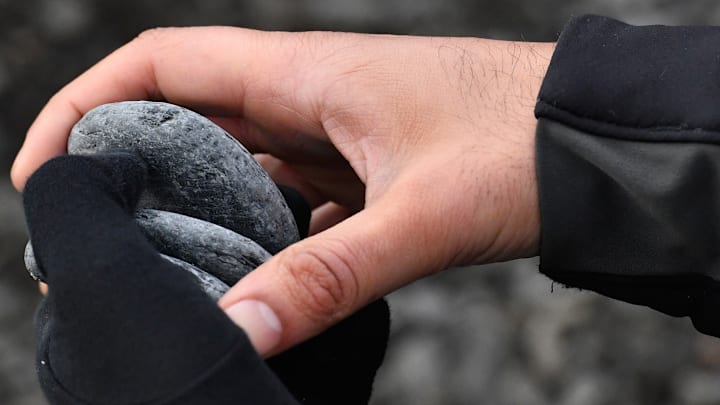Where there is competition, people will find a way to gain an unfair advantage. This holds for major sports like baseball, table games like poker, and it’s now true for the comparatively innocent activity of skipping rocks. Even worse, the misdeed took place at the highest levels of rock-bouncing.
According to The New York Times, the 2025 edition of the World Stone Skimming Championships in Scotland was host to an unspecified number of contestants attempting to doctor their skimming rocks for maximum bouncing action.
A Rock and a Hard Place
Per the rules of the WSSC, rocks to be skipped across the water must be 3 inches or less in width and naturally formed on Easdale, the Scottish island where the annual contest takes place. They are not to be altered. But shortly after this year’s edition began, there was discussion about participants who might have ground the stones into more circular shapes to make them more aerodynamic, a flagrant violation of the rules.
You May Also Like:
- 10 Cool Facts About Curling
- How the Giant Foam Finger Became a Staple of Sports Events
- Meet the Winners of the Kids and Teens Mullet Championships
Add Mental Floss as a preferred news source!
Organizer and play-by-play commentator Kyle Mathews received word of the possible rock performance enhancement as the competition was unfolding. He approached the alleged perpetrators for answers. The bad actors quickly broke down under his questioning and were disqualified from the competition. That left the remaining athletes and their naturally-formed stones to compete in a fair contest.
Speaking with Popular Science, Mathews said the cheating was likely a first-time affair. “This is the first time skimmers have contacted me after the event to raise their concerns,” he said. “So I think if it had been happening in previous years they would have told me then.”

Lucy Wood won the women’s division; Kentuckian Jon Jennings won the men’s event, skimming a total of 580.7 feet and becoming the first-ever American champion. He was undeterred by his own suspicions of malfeasance. “I did see some stones that looked a little too perfect,” he told the Times.
In his conversation with Popular Science, Jennings asserted that the doctored stones might not have offered the right kind of competitive edge. “Me personally, I like more square stones with flat edges,” he said. “The flat edges seem to slice through the water, where rounder edges seem to gallop through the water. The flat square edges give a little more grip, as well.”
The History of the World Stone Skimming Championships
According to Mathews, the skimming championships began in 1983 and were held sporadically until 1997, when it became an annual affair. Both entrants and fans congregate on Easdale, a ferry-accessible island with about 60 permanent residents. The island gets more crowded during the contest, with 400 people competing and over 2000 spectating. Live music, barbecues, and sponsors (Barney’s Beer) round out the event. Revenue is circulated back into the island’s economy and charities.
Contestants can either compete in adult categories (16 and over); juniors (10 to 15 years old); kids (9 and under); teams; and “old tossers” aged 60 years and older.
The 207-foot-long playing field is a decommissioned slate quarry that flooded due to a tidal wave in 1881. Competitors get three tries to skim their stones, which must bounce at least twice to count. The rocks must fit through a 3-inch hole known as “the ring of truth,” which confirms their competition-mandated dimensions. (Mathews said the suspicious rocks escaped detection.)

Expert skimmers focus more on their fingers to get the proper spin rather than flicking the wrist. High-level skimmers can far outmatch your typical adolescent rock-skippers: The current world record belongs to Jennings’s mentor, Kurt Steiner, who got 88 skips on a single toss.
If you don’t need to adhere to official skimming rules, you might benefit from a bulkier stone. According to somewhat frivolous scientific research published in 2023, a chunky stone with a curved underside might force the water to “push” it higher into the air, thus offering a bigger bounce. For maximum skips, however, flatter stones are better.
This isn’t the first time a relatively low-stakes sport attracted a cheating scandal. In 2023, two contestants in a Cleveland, Ohio, fishing contest were found to have stuffed their catches with lead weights to nab the heaviest-catch prize. Because a cash award of roughly $29,000 was involved, the men faced criminal charges of cheating. Both pled guilty as part of a plea deal and spent 10 days in jail. They were also stripped of their fishing licenses for three years.
